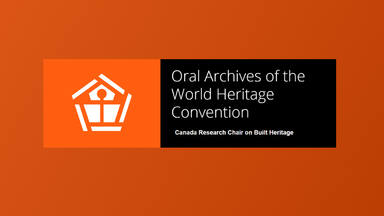
Interview
Sharon Sullivan
World Heritage Convention
haron Sullivan studied history and archeology at the University of New England, Australia, where she graduated in 1972.
She has had a long career in heritage management in the public service, 20 years at the New South Wales National Parks and Wildlife Service, where she was Deputy Executive Director, before being appointed to the Australian Heritage Commission. Through these two institutions, she has helped to establish a legal and procedural framework for the protection and management of Australia's heritage, emphasizing recognition of the rights of indigenous peoples and the importance of community engagement. From 1996 to 2000, she was a member of the Australian delegation to the World Heritage Committee. Today, she runs the heritage consulting firm Sullivan Blazejowski and Associates. She has worked with the World Bank, the World Monuments Fund, the Getty Conservation Institute and the government of China.
Sharon Sullivan holds an Honorary Doctorate from James Cook University and is an Assistant Professor at the University of Queensland and the University of New England. Since 2012, she has chaired the Board of Directors of the Port Arthur Historic Site Management Authority. A long-time member of ICOMOS Australia's Executive Committee, Sharon Sullivan received lifetime membership from ICOMOS International in 2004, as well as being appointed Officer of the Order of Australia (AO) the same year. In 2005, the Australian Archeological Association awarded her the Rhys Jones Medal for outstanding services in archeology. She has published several books and articles, including Looking After Heritage Places (Melbourne University Press, 1991) and more recently, Archaeological Sites: Conservation and Management (Getty Conservation Institute, 2012).
Interview with
Sharon Sullivan
30 October 2013 in Canberra, Australia
The following audio excerpts are from an interview with Sharon Sullivan by Christina Cameron the 30 October 2013 in Canberra. Sharon Sullivan provides an original, critical and encouraging vision of the objectives and mechanisms of the World Heritage Convention. With her long experience in Australia and sites such as Angkor (Cambodia) and the Domain of Chief Roi Mata (Vanuatu), she has repeatedly emphasized the important role of communities and local values in heritage management.
- 1. The World Heritage Convention
- 1a. Sharon Sullivan's Involvement and Role in World Heritage
- 1b. Key Objectives of the World Heritage Convention
- 1c. The World Heritage List
- 1d. Decisions having influenced the implementation of the Convention
- 1e. Successes and failures of the Convention
- 2. The World Heritage Committee
- 3. Advisory bodies: the performance of IUCN, ICOMOS and ICCROM
- 4. The UNESCO Secretariat
- 5. Conservation efforts of States Parties
Oral Archives of the
World Heritage Convention
Under the leadership of the Canada Research Chair on Built Heritage at the University of Montreal, an international team of researchers conducts interviews with pioneers of World Heritage to capture memories of important moments in the history of UNESCO Convention.
Launched in 2006, this initiative is part of the UNESCO History project that celebrated the 60th anniversary of the creation of UNESCO. The Oral Archives project records the precious witness of people closely associated with the creation and implementation of the Convention. Their recollections and views have greatly enriched the book by Christina Cameron and Mechtild Rössler, Many Voices, One Vision: The Early Years of the World Heritage Convention (Ashgate/Routledge, 2013).
